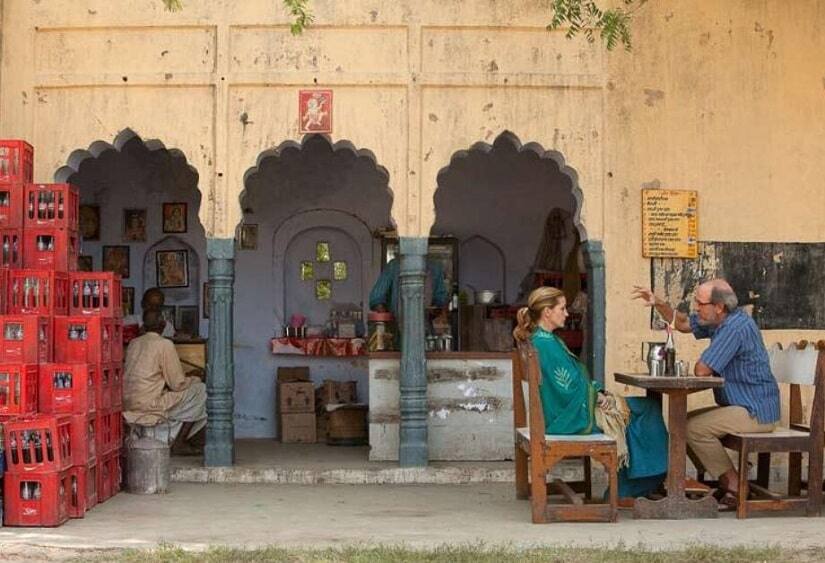Allegedly Problematic’ is a monthly column by Kuzhali Manickavel, which takes a cheeky look at literary/cultural offerings from the past that would now be considered, well, problematic — and asks, ‘But are they really?’. Read more from the series here . *** Read part 1 of this column. Namaste fam! Here we are, with our second column on the somewhat flabbergasting phenomenon of the India Syndrome! In our last piece, we learned about how India can make some Westerners go “crazy” and we all felt bad about that. I mean, really. No one wants to hear that their country and culture, as a whole, is responsible for deranging people when they come for a visit. We also considered the notion of Eastern people (lol) going crazy in Western countries because the culture is so different. But we decided that since we never hear about that, it doesn’t exist. You know, back in the day, when men were men and the white ones ruled India, there was no such thing as India Syndrome. But there was something similar which was vaguely referred to as “going native”. The politically-correct definition of ‘going native’ would perhaps be ‘the adopting of the local lifestyle while inhabiting a colonial region’. The more realistic definition would probably touch on the fact that this was not necessarily a good thing, and that going native somehow meant you were going back to a more pure and simple, but inferior and uncultured way of life. Today, it is no longer ok to imply that we are inferior and uncultured. I don’t think you’re allowed to call us natives anymore either. But it’s still cool to say we are pure and simple and exotic. Which is nice I guess. [caption id=“attachment_8366231” align=“alignnone” width=“825”]  India definitely peddles the kind of spiritualism that Western travellers are looking for. We make a lot of money off of it, in different ways | Still from Eat Pray Love. Image for representation only[/caption] But getting back to India Syndrome. This column is not about making fun of people who have suffered from these delusions. And I’m not saying that India Syndrome can’t be a thing, because racism. But the sentiment and language used when describing aspects of India Syndrome seem weird to me. And I wonder if that is taking the focus away from the real issues. For example, consider when Airault says Western travellers are often looking for a “cultural space that is pure and exotic, where real values have been preserved”. This is a problematic way to describe India, no? There seems to be an air of the noble savage about it which is kind of…well, cringey. If I’m honest, this feels like a problematic way to describe anything. The same thing struck me while reading different articles about India syndrome — a dude that seemed like an obvious con man to me was described as a ‘gnarled sadhu’ or a conduit for an ‘authentic mystic experience’. Going off alone into remote mountain caves in a strange country was described as a voyage of self-discovery, rather than a potentially dangerous idea. Cases of foul play or drowning were hinted at harbouring something more mysterious and sinister. There was a creepy, almost romantic hue permeating the tragedy in these stories and as an Indian, I immediately felt guilty and apologetic. The Western traveller was like a single woman walking alone in the night and India was simultaneously the dark alley and the thing living in the dark alley. India definitely peddles the kind of spiritualism that these travellers are looking for. We make a lot of money off of it, in different ways. The yoga classes, ashrams, astrologers and “sadhus” are all, at the end of the day, making a living this way. It is in our interest for Western travellers to keep coming here, seeking things. But I’m not sure if what we offer them can be called India — it is often just con men hustling, tourism selling tourists what they want to see, and businesses doing business. Whatever the cause may be, having a mental breakdown in a strange country sounds like a scary and awful thing. And ideally, it should not happen to anyone. Next time, join us as we talk about the problematic-ness of discussing problematic things in regional cinema! Is that even a thing?? I sure hope so! (Oh and please donate, if you can. Links here and here.) Kuzhali Manickavel is the author of the short story collections ‘Insects Are Just like You and Me except Some of Them Have Wings’ and ‘Things We Found During the Autopsy’, both available from Blaft Publications
No one wants to hear that their country and culture, as a whole, is responsible for deranging people when they come for a visit.
Advertisement
End of Article


)
)
)
)
)
)
)
)
)



